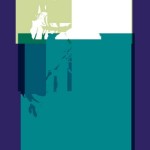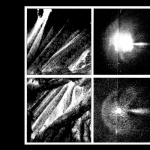. issue XXIV : viii .
. artist : anaesthesia .
. album : s/t .
. year : 1998
. label : no type .
. grade : b minus .
Anaesthesia’s self-titled effort on No Type sounds like the morning after a marathon showing of every version of Blade Runner. It’s a dank, disorienting dislocation in grime, neon and vapor, with all the darkly romantic connotations of futuristic awe. Some of humanity’s strongest actionable emotions are tied to the space age fantasia and naturally upwell. Cue hope, disenchantment, the spectacular and the routine — and the spectacle of the routine for us, the spectators. “Part 2” is even more charged than its sibling, helped by the dense and fervid bowings of strings
Their m.o. seems to be the creation of a pungent atmosphere, whether with the sirenous synth of the bookends “Part 1” and “Part 2” or the screamy discombobulation of “Futility,” which makes me extremely uncomfortable and of which I’ll say no more here — except that this means Anaesthesia has succeeded. Though Turgeon writes of Anaesthesia’s ambience, “at once the word either recalls useless forays into one-chord (one-dimensional?) universe accompanied with new-agey pretenses & patchouli scents,” the band does employ and even enjoy the power of sustained notes, using the drone of machines or choruses to great effect in three of these songs. Indeed, “Orthodoxia” involved a throat-singing backdrop for a qawwali-like soloist and his partner, a ney that soars like a quetzal. Understood most properly as a duet of identical attitudes in “singing” — prodigious, curious, light-hearted, delighted, and whimsical with big “vocal” swoops and invested, total unabashedness — the juxtaposition of these voices is the highlight of the album. Interestingly, the chorus and ‘space sounds’ are the same as in “Orthodoxia” as in “Part 1” and “2,” but the mood is different. Where the “Part” pieces present outer scenery, “Orthodoxia” conjures an inner scene, a place of warm beauty and transfiguration, its climate thick with citrus, dirt and incense.
Least productive, “Scratch 4” is free-jazzier and much less heavy than anything else, though still weird and 80’s. Instead of “Blade Runner,” this implies too much “E.T.” –though it could be a soundtrack for almost anything on VHS, whether the outro of a cop drama, a best-buddies training montage, a big haired sex scene in beige sheets, or the faces of neighbors after a soap tragedy.
Viewed in its entirety, Anaesthesia is a point of confusion somewhere between Blade Runner, Karou Abe, 90’s trance and a histrionic inpatient slam poet diva. It might not be worth keeping — where’s the coherency? — but it is worth a listen.



